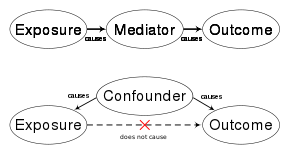
Back تأثير مخالط (إحصاء) Arabic Variable de confusió Catalan Zavádějící proměnná Czech Confounder Danish Störfaktor German Factor de confusión Spanish اختلاط Persian Facteur de confusion French משתנה מתערב HE Efek pengacau ID
This article may be too technical for most readers to understand. (September 2019) |

In causal inference, a confounder (also confounding variable, confounding factor, extraneous determinant or lurking variable) is a variable that influences both the dependent variable and independent variable, causing a spurious association. Confounding is a causal concept, and as such, cannot be described in terms of correlations or associations.[1][2][3] The existence of confounders is an important quantitative explanation why correlation does not imply causation. Some notations are explicitly designed to identify the existence, possible existence, or non-existence of confounders in causal relationships between elements of a system.
Confounds are threats to internal validity.[4]
- ^ Pearl, J., (2009). Simpson's Paradox, Confounding, and Collapsibility In Causality: Models, Reasoning and Inference (2nd ed.). New York : Cambridge University Press.
- ^ VanderWeele, T.J.; Shpitser, I. (2013). "On the definition of a confounder". Annals of Statistics. 41 (1): 196–220. arXiv:1304.0564. doi:10.1214/12-aos1058. PMC 4276366. PMID 25544784.
- ^ Greenland, S.; Robins, J. M.; Pearl, J. (1999). "Confounding and Collapsibility in Causal Inference". Statistical Science. 14 (1): 29–46. doi:10.1214/ss/1009211805.
- ^ Shadish, W. R.; Cook, T. D.; Campbell, D. T. (2002). Experimental and quasi-experimental designs for generalized causal inference. Boston, MA: Houghton-Mifflin.
© MMXXIII Rich X Search. We shall prevail. All rights reserved. Rich X Search